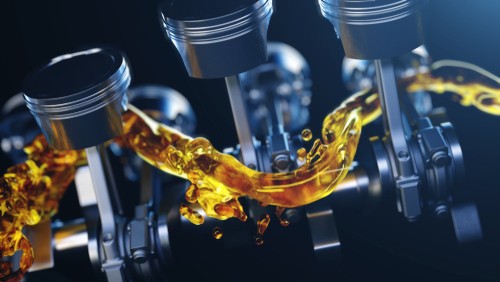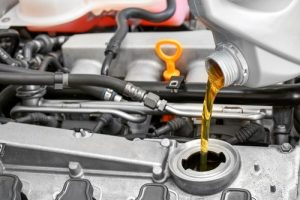Essential Fluids for Your Car or Truck: Why They Matter
Coaches and leaders from around Wisconsin and beyond gathered for a unique learning and developmental opportunity at the the third-annual BIOS Leadership & Coaching Symposium. Because attending this event helps coaches run their teams like a well oiled machine. And having a “well-oiled” machine approach is important, not just in sports, but in your vehicle, too.
As it happens, it’s, in fact, a variety of fluids that keep your car or truck running smoothly and efficiently. Because these fluids act as the lifeblood of your vehicle, ensuring that vital components remain lubricated, cooled, and free of debris. And understanding the importance of each fluid can help you maintain your vehicle’s health and avoid costly repairs. So, in this blog the experts at Meineke in Madison break down the essential fluids that play a key role in your vehicle’s operation and why each is important.
1. Engine Oil
Engine oil is the most critical fluid in your vehicle. Because, it lubricates the engine’s internal components, reducing friction and wear while helping to keep the engine cool. However, over time, oil can break down or become contaminated with dirt and debris. And this can lead to reduced performance or engine damage.
Why It’s Important:
-
- Prevents overheating by reducing friction.
- Protects the engine from wear and tear.
- Extends the engine’s life by keeping it clean.
When to Change It:
-
- Most vehicles need an oil change every 3,000 to 7,500 miles, depending on the type of oil and driving conditions.
2. Transmission Fluid
Transmission fluid is important for both manual and automatic transmissions. Because, it lubricates the transmission gears and ensures smooth gear shifts. Also, in automatic transmissions, the fluid acts as a coolant and helps transmit power from the engine to the wheels. So, if you suspect that your transmission fluids are low or contaminate, head to Meineke on Milwaukee Street in Madison.
Why It’s Important:
-
- Enables smooth shifting between gears.
- Prevents wear on transmission parts.
- Cools and protects the transmission from heat damage.
When to Change It:
-
- Check your owner’s manual for specifics, but most manufacturers recommend changing transmission fluid every 30,000 to 60,000 miles.
3. Coolant (Antifreeze)
Coolant, or antifreeze, helps regulate your engine’s temperature by absorbing excess heat and dissipating it through the radiator. And this prevents your engine from overheating in hot weather and freezing in cold weather.
Why It’s Important:
-
- Prevents engine overheating by controlling temperature.
- Protects against freezing in cold temperatures.
- Prevents rust and corrosion inside the engine.
When to Change It:
-
- Coolant should typically be flushed and replaced every 30,000 to 50,000 miles, but it’s important to regularly check levels and top off as needed.
4. Brake Fluid
Brake fluid transfers the force from your foot on the brake pedal to the brake pads, allowing your car to stop. And it operates under high pressure and temperature. but, its performance can degrade over time due to moisture absorption, which reduces braking efficiency. So, it’s important to have your brake fluid checked during your regularly scheduled maintenance.
Why It’s Important:
-
- Ensures reliable braking by maintaining hydraulic pressure.
- Prevents corrosion in the brake system.
When to Change It:
-
- Brake fluid should be changed every two years or as recommended by your vehicle’s manufacturer.
5. Power Steering Fluid
Power steering fluid allows you to easily steer your vehicle by creating hydraulic pressure in the steering system. And without it, turning the steering wheel would require significantly more effort. So contact Meineke in Madison if you’re concerned your steering fluids may be low.
Why It’s Important:
-
- Enables smooth, easy steering.
- Prevents wear on the power steering components.
When to Change It:
-
- Some manufacturers recommend changing power steering fluid every 50,000 miles, while others suggest just checking the fluid level regularly and topping off as needed.
6. Windshield Washer Fluid
Windshield washer fluid may seem less critical than others, but it’s essential for visibility. Because, it helps you clean dirt, bugs, and debris from your windshield, especially during inclement weather.
Why It’s Important:
-
- Maintains clear visibility, ensuring safer driving.
When to Change It:
-
- There’s no need to change it, but be sure to keep it topped off. And this is especially true before long trips or during seasons when windshield contamination is more common.
7. Differential Fluid
Differential fluid lubricates the gears in your car’s differential, which is responsible for allowing your wheels to rotate at different speeds. And this is especially important particularly when turning.
Why It’s Important:
-
- Prevents excessive wear on the differential gears.
- Ensures smooth turning and consistent wheel movement.
When to Change It:
-
- Differential fluid should generally be replaced every 30,000 to 60,000 miles, but refer to your owner’s manual for specific guidance.
8. Transfer Case Fluid (For 4WD and AWD Vehicles)
Transfer case fluid lubricates the components in a vehicle’s transfer case, which is found in four-wheel and all-wheel-drive systems. And this fluid helps ensure that power is distributed between the front and rear axles smoothly.
Why It’s Important:
-
- Ensures proper power distribution to all four wheels.
- Protects the transfer case from damage due to friction.
When to Change It:
-
- Transfer case fluid should be changed every 30,000 to 60,000 miles, depending on your driving conditions and manufacturer’s recommendations.
Routine Maintenance Is Key to Keep Your Vehicle’s Fluids in Top Shape
Regularly checking and maintaining your car or truck’s fluids is key to keeping it running efficiently and preventing breakdowns. Whereas, skipping fluid maintenance can lead to expensive repairs or even leave you stranded on the road. So, make sure you follow your vehicle’s recommended maintenance schedule, and call Meineke in Madison if you’re unsure about when or how to replace these fluids.
If the Meineke in Madison is not a convenient location, check out these other locally-owned Meineke locations:
MEINEKE SHEBOYGAN #2989
3667 S Taylor Drive
Sheboygan, WI 53081
Call (920) 783-6013
MEINEKE MADISON #355
4008 Milwaukee Street
Madison, WI 53714
Call (844) 374-1281
MEINEKE MADISON #1649
437 Commerce Drive
Madison, WI 53719
Call (833) 814-2314
MEINEKE SUN PRAIRIE #2057
2518 Ironwood Drive
Sun Prairie, WI 53590
Call (844) 687-9785
MEINEKE APPLETON #2136
1708 W. Wisconsin Avenue
Appleton, WI 54914
Call (866) 532-0443
MEINEKE COTTAGE GROVE #2474
222 W. Cottage Grove Road
Cottage Grove, WI 53527
Call (844) 453-2300
MEINEKE CAR CARE | LOCAL CAR CARE | LOCAL MECHANIC | MADISON CAR CARE | MADISON AUTO CARE | CAR CARE NEAR ME | OIL CHANGE NEAR ME | ASE CERTIFIED | EV CARE | EV BATTERY | CLUTCH |BRAKES NEAR ME | BRAKE FLUID | SERPENTINE BELT | TRUCK CARE | TRUCK MAINTENANCE | TIRE REPAIR | TIRES
#MEINEKECARCARE #LOCALCARCARE #MadisonCarCare #MadisonCare #CarCareNearMe #MeinekeCares #Meineke #OilChangeNearMe #OilChange #ASEcertified #Diagnositics #EV #EVbattery #UsedCarRepair #Clutch #Brakes #BrakeFluid #SerpentineBelt #TruckMaintenance #TireRepair #Tires

